Lochstanzmaschinen

Hydraulic guillotine shear
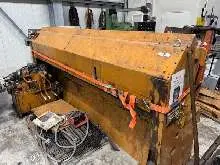
- Year of manifacturing:
- 1980
- Control NC | Sheet width 3,5 mm |
Compound Folding Machine

- Year of manifacturing:
- Operational weight 3.800 kg | Control konventionell | Sheet width 3200 mm | Sheet thickness 2,5 mm |
Plate Bending Machine - 4 Rolls

- Year of manifacturing:
- 1990
- Control konventionell | Sheet width 2050 mm | Sheet thickness 7,5 mm |
Plate Bending Machine - 3 Rolls
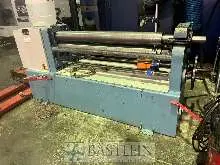
- Year of manifacturing:
- 2011
- Control konventionell | Sheet width 1270 mm | Sheet thickness max. 4,5 mm | Overall dimensions 2470 x 750 x 1000 mm |
Mechanical guillotine shear

- Year of manifacturing:
- 2018
- Control system konv. | Control konventionell | Sheet width 2050 mm | Sheet thickness 3.0 mm | Table width 400 mm | Table height 850 mm |
Plate Bending Machine - 4 Rolls
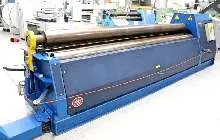
- Year of manifacturing:
- 2001
- Control system DIGI | Operational weight 6000 kg | Control konventionell | Sheet width 3100 mm | Sheet thickness 6.0 mm ST |
Laser Cutting Machine
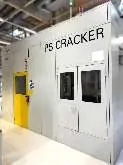
- Year of manifacturing:
- 2013
- Control CNC |
Bending machine horizontal
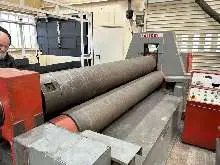
- Year of manifacturing:
- 1986
- Control konventionell | Sheet width - mm | Sheet thickness - mm |
Bending machine horizontal
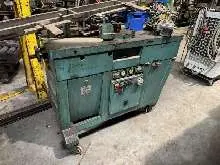
- Year of manifacturing:
- 1991
- Control konventionell | Table dimensions - mm |
Decoilers for Coils
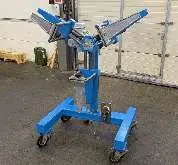
- Year of manifacturing:
- Operational weight 70 kg | width 800 mm | Control konventionell | Length 1020 mm | Height 1850 mm |
Hydraulic guillotine shear
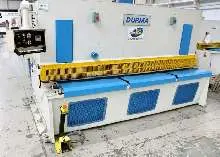
- Year of manifacturing:
- 2000
- Control system konv. | Operational weight 11800 kg | Control konventionell | Sheet width 3100 mm | Sheet thickness 13.0 mm |
Laser Cutting Machine
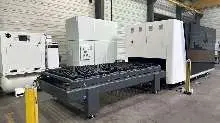
- Year of manifacturing:
- 2025
- Control system CNC | Operational weight 4150 kg | Max. workpiece weight 1095 kg | Control CNC | Table width 1524 mm | Table length 3048 mm |
Press Brake hydraulic
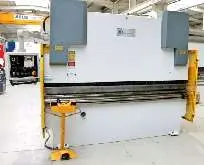
- Year of manifacturing:
- 1998
- Control system "P 40" | Operational weight 7550 kg | Control NC | Table width 104 mm |
Bending machine horizontal
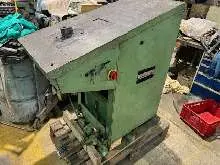
- Year of manifacturing:
- 1990
- Control konventionell | Table dimensions - mm |
Hydraulic guillotine shear

- Year of manifacturing:
- 1991
- Control konventionell | Sheet width 3000 mm | Sheet thickness 6 mm |
Compound Folding Machine
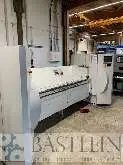
- Year of manifacturing:
- 2001
- Control NC | Sheet width 2520 mm | Sheet thickness 4 mm |
Section Steel Shear

Plate Bending Machine - 3 Rolls

- Year of manifacturing:
- 2007
- Control konventionell | Sheet width 1050 mm | Sheet thickness 3 mm |
Press Brake hydraulic

- Year of manifacturing:
- NEU
- Control system Cybelec CybTouch 12 | Operational weight 13.000 kg | Control CNC | Overall dimensions 4500x2000x2900 mm |
Press Brake hydraulic

- Year of manifacturing:
- 1996
- Control system Cybelec DNC 800 | Control CNC |
Press Brake hydraulic

- Year of manifacturing:
- 2008
- Control system Cybelec | Control CNC |
Press Brake hydraulic

- Year of manifacturing:
- 2018
- Control konventionell |
Sheet Metal Deburring Machine

- Year of manifacturing:
- 2025
- Control konventionell | Overall dimensions 3300 x 1500 x 1800 mm |
Hydraulic guillotine shear
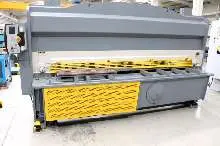
- Year of manifacturing:
- 2005
- Control system SC 100 T | Control CNC | Sheet width 3050 mm | Sheet thickness 13.0 mm |
Hydraulic guillotine shear
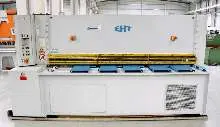
- Year of manifacturing:
- 2000
- Control system ELGO P8511 | Operational weight 8000 kg | Control NC | Sheet width 3050 mm | Sheet thickness 10.0 mm |
Flanging and Seam Rolling Machine
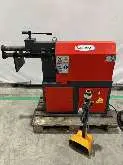
- Year of manifacturing:
- 2021
- Operational weight 295 kg | Control konventionell | Sheet thickness 2.5 mm |
Compound Folding Machine

- Year of manifacturing:
- Control system konv. | Operational weight 3500 kg | Control konventionell | Sheet width 3020 mm | Sheet thickness 3.0 mm ST |
Compound Folding Machine
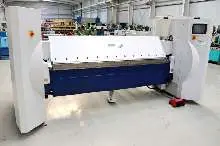
- Year of manifacturing:
- 2000
- Control system POS 2000 | Operational weight 4100 kg | Control CNC | Sheet width 2520 mm | Sheet thickness 4.0 mm ST |
Press Brake hydraulic
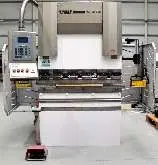
- Year of manifacturing:
- 2010
- Control system DNC 60 PS | Control CNC | Table width 100 mm | Table height 900 mm |
Press Brake hydraulic

- Year of manifacturing:
- 2003
- Control system DM 51 | Operational weight 2500 kg | Control CNC | Operating time ~ 13.300 h | Table height 800 mm |
Press Brake hydraulic

- Year of manifacturing:
- 2009
- Control system ELGO NC | Operational weight 2200 kg | Control NC | Operating time ~ 9.600 h | Table width 140 mm | Table height 800 mm |
Used Machines Sheet metal working
Sheet metal processing machines
Sheet metal processing machines manufacture sheets in the requested shape. The specialized equipment leads the tool and the part being machined. They are used in industry, trade and and during the manufacturing process of different tools.
A huge variety of different production possibilities for metal sheet
Sheet metal processing includes different production possibilities like punching, lasering, cutting, tilting, beding and mechanical installation. Metal processing machines are available with or without CNC controller. The CNC technology is able to transmit data to the workpiece. The programming software allows operators to check whether it is possible to bend the part.
Fields of application
Metal sheets can be used in many different areas for example in steel construction or in automotive industry. Furthermore, they can be applied for the construction of appliances, machines, rail vehicle, ships and pipelines.
Different applications require specific metal sheets and demand specific requirements for the material and size. Sheet metal processing machines can prepare metal sheets for their intended use. There is a wide range of metal processing machines for different production processes. With certain installations it is possible to realize operations in a quick and precise way.
Cutting
Flat sheets can be tailored to the need of individual sizes. There are different ways to cut the metal for example mechanical procedures like sawing, shears or water-jet cutter. Other suitable machines can be curling tongs, plasma cutting machines or laser cutting machines that work when exposed to heat energy.
Punching
The punching of metal sheets achieves precise results. This kind of sheet metal working requires specific tools to punch the flat parts in the desired shape. Punching machines are also available as combined laser-punching installations.
Folding machines
Metal sheets can be bent to get three-dimensional components. Folding press quipment is available with manual clamping and pneumatic clamping. Press brakes and embossing machines are suitable for the folding of metal plates. The folding of metal sheets requires special care. To achieve a plastic deformation, it is necessary to overstep the yield strength of the metal but not the tensile strength. Overstepping the tensile strength could damage the material. Heat can make it easier to deform thick metal sheets.
Round bending
Round bending causes the deformation of metal sheets. It is chipless and the metal sheet are not chopped. It`s suitable for cases where the sheet plate has to include a soft rounding. Round bending machines or roller rounding machines are the suitable machines for this task.
Milling and machining
The milling is often at the beginning of the manufacture. It helps to design the outline of the workpiece.
The milling machine has a rotating cutting tool which removes material of the workpiece. This process includes three advance directions and is able to create complex components.
Other sheet metal forming proceedings
Drilling and punching are also common processes for sheet metal forming. Moreover, it is possible to connect metal sheets through welding, hemming, soldering, rivets, bonding or screws. The type of metal decides which process is particularly suitable. The production types are also feasible through special sheet metal processing machines or sheet metal forming processes.









